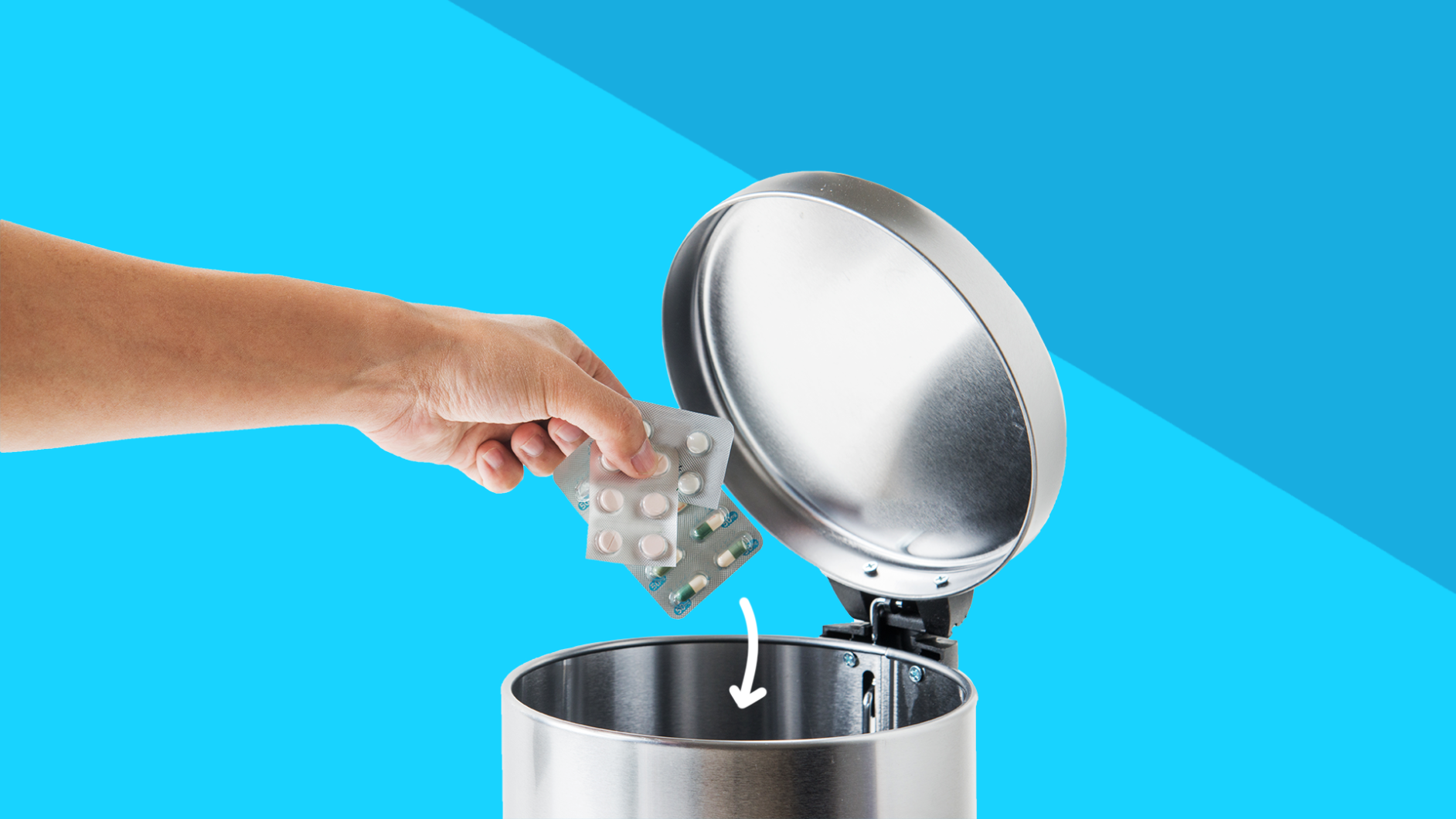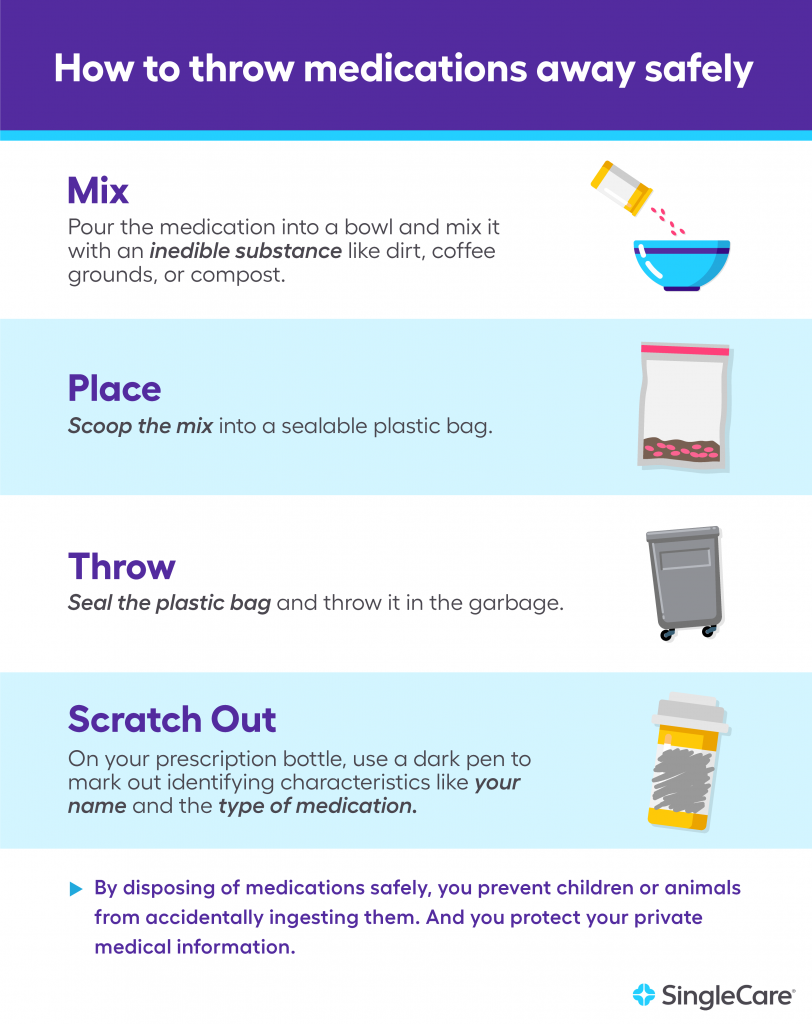Key takeaways
Improper disposal of medication can lead to environmental pollution, accidental ingestion, and prescription drug misuse, posing significant risks to community safety and well-being.
Expired or unused medications should be disposed of properly, utilizing designated take-back programs at pharmacies or through specific disposal methods recommended by the FDA to prevent misuse and environmental harm.
The FDA’s MPTS method (Mix, Place, Throw, Scratch out) for home disposal of medications minimizes the risk of drug misuse by making medications undesirable and unrecognizable in household trash.
Certain medications, due to their potential for misuse or fatal overdose, are recommended by the FDA to be flushed if take-back options are not readily available, although this method is generally discouraged to protect water sources.
It is common for individuals to have medication at home that they no longer require, whether it be over-the-counter drugs such as allergy medicine or prescriptions like antibiotics. It could be because the drugs have expired or the prescription has changed, and they are no longer needed.
No matter the reason, it’s essential to follow proper medication disposal practices as outlined in this guide. Keep reading to learn how to dispose of prescription drugs.
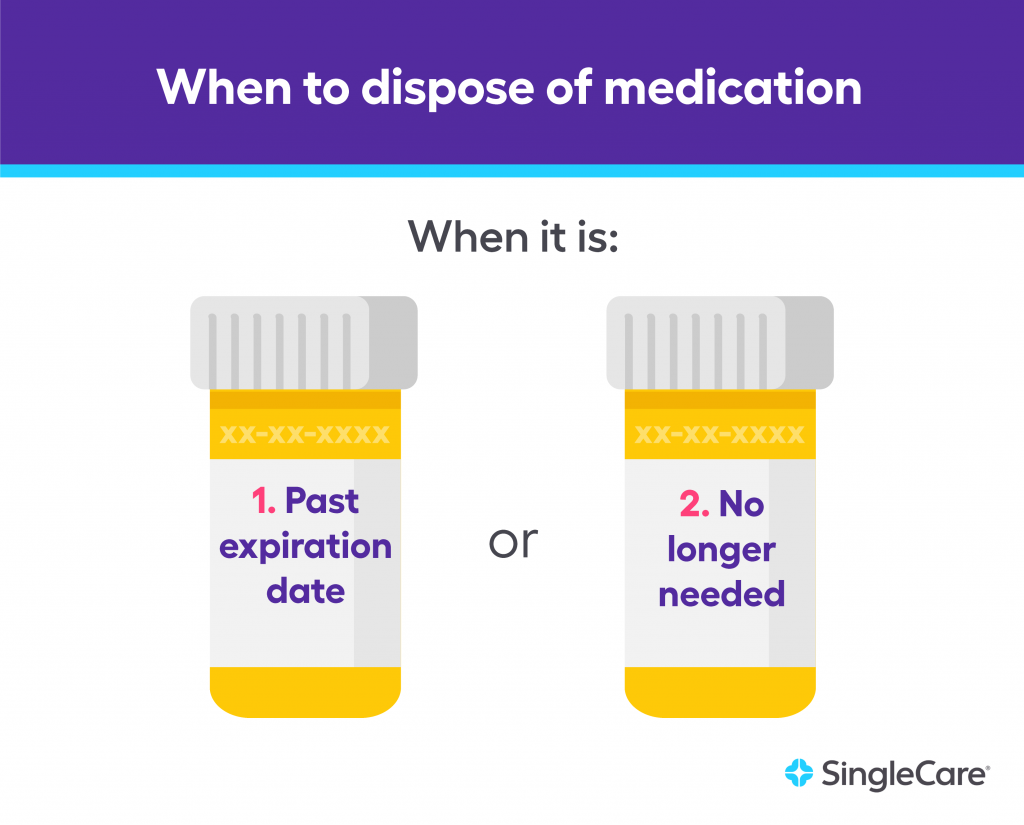
Dangers of improperly disposing of medication
Improper medication disposal poses significant risks, including environmental pollution, accidental ingestion, and prescription drug misuse. By learning and following the proper methods of medication disposal, you can help protect yourself and others from harm and help improve the safety and well-being of your community.
Accidentally consuming expired medication
If unused medications are not disposed of properly, serious dangers may occur. First, you risk accidentally taking that medication. So, what’s the harm in taking medication after its expiration date?
“Most medications begin to lose their potency with time, and so the most common danger of an expired medication is it may not be strong enough to control the condition it was prescribed for,” says Bob Parrado, R.Ph., a board member of Hillsborough County Anti-Drug Alliance (HCADA) in Tampa, Florida.
This means your expired ibuprofen might not cure your headache very quickly—which isn’t a big deal. If you’re relying on medication to treat a serious issue such as heart disease, however, you could be putting yourself at a major risk.
The U.S. Food and Drug Administration (FDA) warns you should never take expired medicine, as they can be “less effective or risky due to a change in chemical composition.” Additionally, some medications “are at risk of bacterial growth.”
The FDA also cautions that expired antibiotics may not work to treat infections because they’re less potent. This can lead to antibiotic resistance and more serious illnesses.
“There are a few medications, such as tetracycline-class antibiotics, that can become toxic as they degrade,” says Parrado.
Even medications that aren’t expired can be dangerous. For example, you might have been prescribed painkillers following major surgery and found that you didn’t use them all. When you don’t dispose of medication you’re no longer using, you risk the chance of certain drugs being misused either on purpose or by accident.
According to the National Institute of Drug Abuse, this is especially true with opioids, barbiturates, sleep medications, and amphetamines ﹘ such as those used to treat ADHD.
Over-the-counter medications, such as cough syrups containing dextromethorphan (DXM), may be abused for their effects. The anti-diarrheal medication loperamide could be taken in large doses for the purpose of experiencing a high. While these two medications don’t require a prescription, they can be misused if they get into the wrong hands.
Environmental concerns
When you do decide to dispose of medication, it’s essential to do it in the safest way possible. Failing to dispose of medication safely can put yourself, others, and the environment at risk.
When people improperly flush medicine down the toilet, rinse it down the drain, or throw it in the garbage, medications can end up in the local water supply. The United States Geological Survey (USGS) concluded that the majority of small streams in the U.S. contain a mixture of chemicals, including pharmaceuticals, which can pose a risk to wildlife.
While the risk to humans doesn’t appear to be as severe as to aquatic organisms and wildlife, our current water treatment technology might not be enough to remove the small, dissolved medication components. The potential effects may be far-reaching.
Personal safety
Improper medication disposal can also result in risks to your personal safety. As covered in this guide, a major part of proper disposal of medication at home is to make medications undiscoverable in household garbage. Otherwise, if the medication is a controlled substance like an opioid, there is a chance that someone who misuses medication could discover it. They might also think you have more, which may motivate someone to seek you out for theft.
When should you dispose of medication?
You should dispose of medication any time it is expired, unwanted, or unused. Unwanted or unused medicines could be medications that are simply no longer needed. This could happen when you no longer need a prescription or when someone using a prescription passes away.
Which drugs and medications can you discard?
You can and should dispose of any drugs or medications that are expired, unused, or unwanted. These typically fall into three categories.
- Over-the-counter (OTC)
- Prescription
- Illegal
You can dispose of most over-the-counter or prescription drugs at home or a pharmacy. If you are unsure whether it’s safe to dispose of something at home, visit your pharmacy, where they often provide containers or a waste disposal service to help you handle it safely.
For medications or drugs that may be controlled or illegal, the Drug Enforcement Agency hosts a series of Take Back Days where law enforcement and federal agencies accept drugs and medications for disposal with no questions asked. The most recent Take Back Day was in October 2022, which collected 324 tons of medication across 4,902 collection sites.
How can I find medication disposal near me?
You can find safe drug disposal sites through a variety of online tools. We recommend the following:
- The U.S. Drug Enforcement Administration (DEA) Controlled Substance Public Disposal Locations search tool
- The Safe.pharmacy Drug Disposal location search tool.
How to dispose of medication at pharmacies
If you don’t feel comfortable disposing of it at home, there are pharmacies, hospitals, and other healthcare facilities that will take your unwanted medication and dispose of it for you.
Those who want to dispose of medication through a pharmacy have two options, depending on the pharmacy. They can either provide patients with the option to mail in their unwanted medications or place them in one of their safe medication disposal kiosks.
How do pharmacies dispose of medications?
Typically, medications that are disposed of via take-back programs are completely incinerated. This guarantees the medications will not be misused or accidentally used by anyone.
Does CVS Pharmacy dispose of old medications?
Between 2014 and 2022, CVS has worked with local law enforcement agencies to responsibly dispose of over one million pounds of medication in communities across the U.S.
How do I dispose of prescription drugs at Walgreens?
As of June 2019, every Walgreens location in the United States has been outfitted with year-round safe drug disposal options. This means at every Walgreens, you will have access to a secure Walgreens medication disposal kiosk, or a pharmacist can provide you with DisposeRX packets. Other options may be available upon request.
How to dispose of medication at home
When it comes to disposing of unwanted medication at home, the recommended steps by the FDA is the MPTS method: mix, place, throw, scratch out. Using the MPTS method will reduce the likelihood of someone misusing your unwanted medication.
Mix
The first step in disposing of unwanted medication in your home garbage is to mix the medication with an unappealing substance such as dirt, cat litter, or used coffee grounds. Please note that you should NOT crush tablets or capsules.
Place
Next, you will place the mixture in its own container such as a sealed paper or plastic bag. Placing the mix in a container ensures the unwanted medications won’t leach into soil and water systems once they’re in a landfill site.
Throw
After the mixture is placed in a sealed bag, throw it in your household trash.
Scratch out
Finally, when disposing of the prescription bottle, scratch out all personal information including your name, pharmacy information, name of the prescription, and prescription number. Then you can dispose of the container.
What medications can be flushed?
According to the FDA’s Flush List, you can flush the following prescription medications if you can’t make it to a drug take-back facility and need to dispose of your medication right away:
- Benzhydrocodone / Acetaminophen (Apadaz)
- Buprenorphine (Belbuca, Bunavail, Butrans, Suboxone, Subutex, Zubsolv)
- Diazepam (Diastat / Diastat AcuDial rectal gel)
- Fentanyl (Abstral, Actiq, Duragesic, Fentora, Onsolis)
- Hydrocodone (Anexsia, Hysingla ER, Lortab, Norco, Reprexain, Vicodin, Vicoprofen, Zohydro ER)
- Hydromorphone (Dilaudid, Exalgo)
- Meperidine (Demerol)
- Methadone (Dolophine, Methadose)
- Methylphenidate (Daytrana transdermal patch system)
- Morphine (Arymo ER, Embeda, Kadian, Morphabond ER, MS Contin, Avinza)
- Oxycodone (Combunox, Oxaydo/Oxecta, OxyContin, Percocet, Percodan, Roxicet, Roxicodone, Targiniq ER, Xartemis XR, Xtampza ER, Roxybond)
- Oxymorphone (Opana, Opana ER)
- Sodium Oxybate (Xyrem oral solution)
- Tapentadol (Nucynta, Nucynta ER)
If you’re at all able to take the above prescription medicines to an official take-back site, including a pharmacy, it is highly recommended that you do so. However, since the above medications are often misused and can be fatal with a single dose if not used according to a prescription, the FDA has approved them to be flushed.
How to dispose of prescription pill bottles
Whether you dispose of your medication in the garbage or flush it down the toilet, you should properly dispose of your prescription containers as well. Someone might find the bottles in your trash, as this can be an easy source for those who abuse substances. If they think you have more of the medication they seek, they could target your home.
As mentioned above, before discarding your prescription bottles, you should scratch out any personal information, including the medication, your name, the pharmacy, the pharmacy phone number, and the prescription number. Anything considered confidential patient information needs to be covered or crossed-out.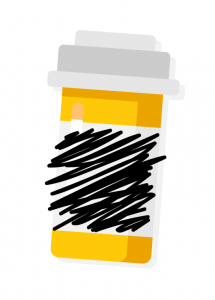
If you remove the sticker label completely, you may be able to recycle your prescription bottle. However, not all bottles can be recycled curbside by all municipalities. The issue is, in part, due to the small size of a pill bottle. Many facilities simply can’t handle recyclables that small.
If your area cannot curbside recycle pill bottles, your pharmacy might. Check with your local pharmacy to see if they’re able to dispose of your empty pill bottles.
What is the best way to dispose of prescription drug receipts?
In order to protect your privacy and ensure your safety against those who misuse drugs, you should take the same care with your prescription drug receipts as you do with your containers. This means you should do your best to destroy any personal information on those receipts or any instructions that come with your medications once you’re done with them.
Common methods of destroying that information include shredding, just as you would other sensitive documents. You can also black out sensitive information with a dark marker.
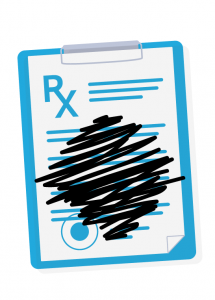
The methods outlined in this guide might seem like too much for some. However, with prescription drug misuse on the rise, it doesn’t hurt to be too safe. After all, the CDC reports that “more than 106,000 persons in the U.S. died from drug-involved overdose in 2021” which includes different types of medications, such as prescription opioids, as well as illegal drugs.
Don’t simply flush medications or toss them into the trash. By doing your part to ensure your medications, regardless of type, are disposed of properly, you could be saving lives while keeping yourself, your family, and your pets safe.
For more information about keeping your family safe from prescription drug misuse, please read our related guide.



